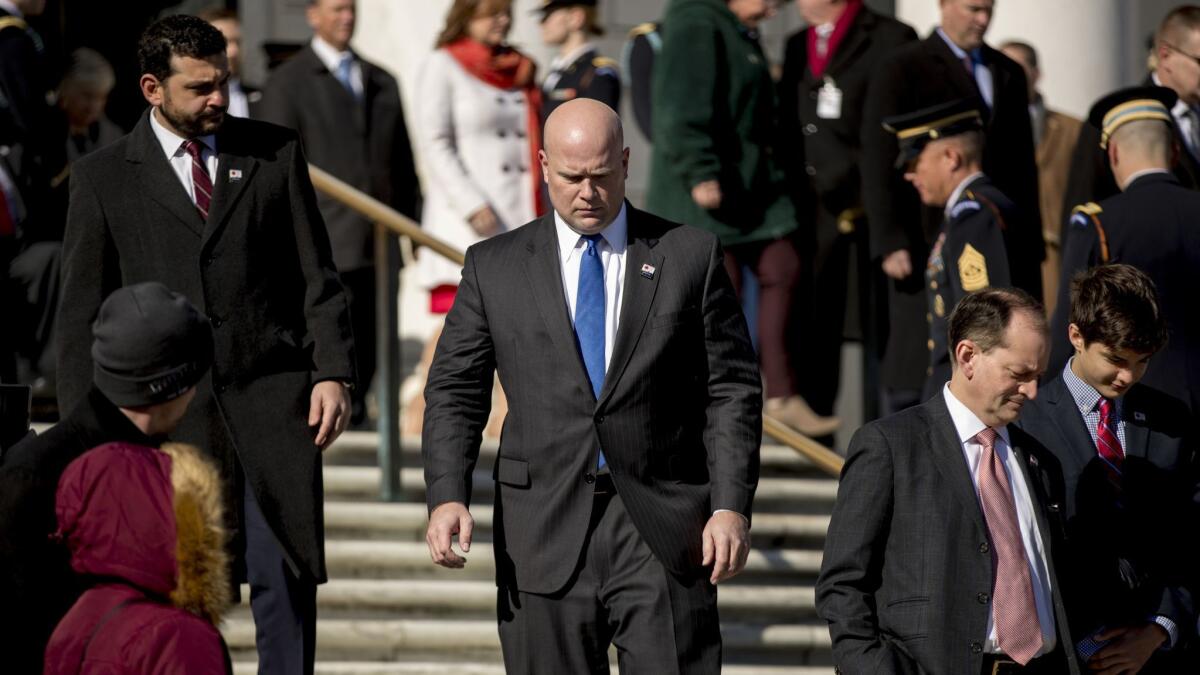Justice Department releases memo defending Matthew Whitaker as acting attorney general

- Share via
The Justice Department released a memorandum Wednesday defending the legality of President Trump’s appointment of Matthew Whitaker as acting attorney general, rejecting criticism from some lawyers that the move violates the Constitution.
Since his appointment last week, some have charged that Whitaker, who served as the chief of staff to the previous attorney general, Jeff Sessions, is not legally eligible to serve as the head of the Justice Department because he is not a Senate-confirmed official.
On Tuesday, Maryland Atty. Gen. Brian Frosh, a Democrat, asked a federal judge to block Whitaker from serving as acting attorney general, arguing that Deputy Atty. Gen. Rod Rosenstein should instead take on the role.
The Justice Department’s Office of Legal Counsel, which provides legal guidance to the federal government, said in a 20-page memo that past practice, court rulings and legal analysis show that the Whitaker appointment is legal. In particular, it says the scenario is expressly authorized by the 1998 Vacancies Reform Act.
Trump’s appointment of acting attorney general may be unconstitutional, legal experts say »
The memo also notes that before Sessions was forced out of the job, the White House had sought advice from the Office of Legal Counsel and was told Whitaker could be appointed.
“As all three branches of government have long recognized, the president may designate an acting official to perform the duties of a vacant principal office, including a Cabinet office, even when the acting official has not been confirmed by the Senate,” the memo said.
The memo notes that Trump has now done it six times, and that then-President Obama did it twice, and then-President George W. Bush did it once.
Interestingly, the legal opinion also concludes that, even if Trump had fired Sessions, he could have replaced him with a non-Senate-confirmed government employee for a period of up to seven months. By that reasoning, the president has the power to replace Cabinet-level officials at will and put them in charge of major government branches for half a year or more.
Critics of the Whitaker selection have argued the Vacancies Reform Act should not take precedence over other statutes and the Constitution’s formula for replacing senior government officials.
“Few positions are more critical than that of U.S. Attorney General, an office that wields enormous enforcement power and authority over the lives of all Americans,” Frosh, the Maryland attorney general, said in a statement Tuesday.
Trump tapped Whitaker to serve as acting attorney general last week after Sessions resigned at the president’s request. Whitaker’s elevation has raised concerns about his qualifications, his past statements as a U.S. Senate candidate and his business practices.
The legal challenge to Whitaker’s appointment comes as part of Maryland’s ongoing federal lawsuit that is trying to force the Trump administration to uphold a key provision of the Affordable Care Act.
Frosh’s filing argues that Whitaker’s promotion violates the Appointments Clause of the Constitution, which requires “principal” senior officials, such as the attorney general, to be confirmed by the Senate. Maryland also contends that the appointment violates a federal statute that lays out the line of succession and gives authority to the deputy attorney general when the top job is vacant.
A number of current and former government lawyers have said that, while elevating Whitaker to attorney general was unwise and unprecedented, it is not illegal.
A senior Justice Department official said the Office of Legal Counsel’s analysis of the practice found 160 such instances in which a non-Senate-confirmed individual became the acting head of an agency, but the vast majority of those instances came before 1870.
Devlin Barrett writes for The Washington Post.
More to Read
Get the L.A. Times Politics newsletter
Deeply reported insights into legislation, politics and policy from Sacramento, Washington and beyond. In your inbox twice per week.
You may occasionally receive promotional content from the Los Angeles Times.









